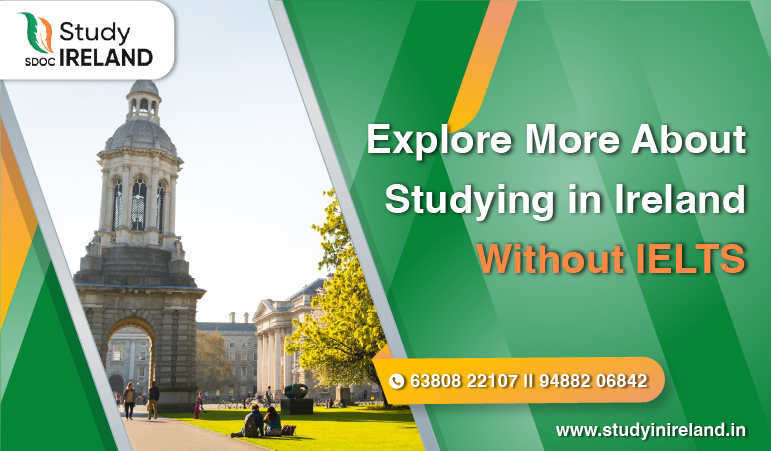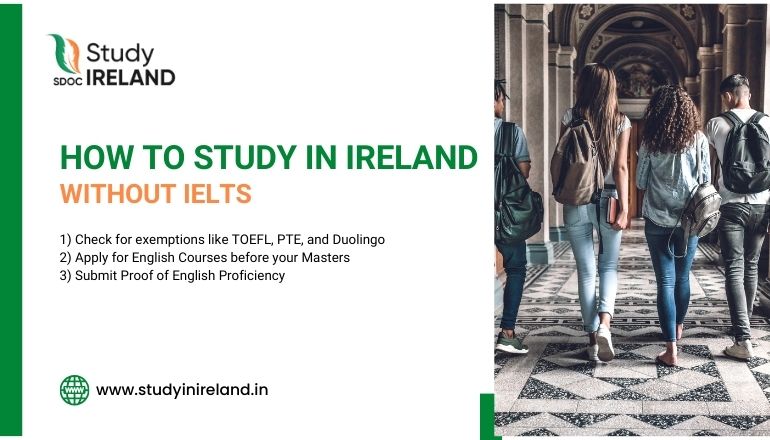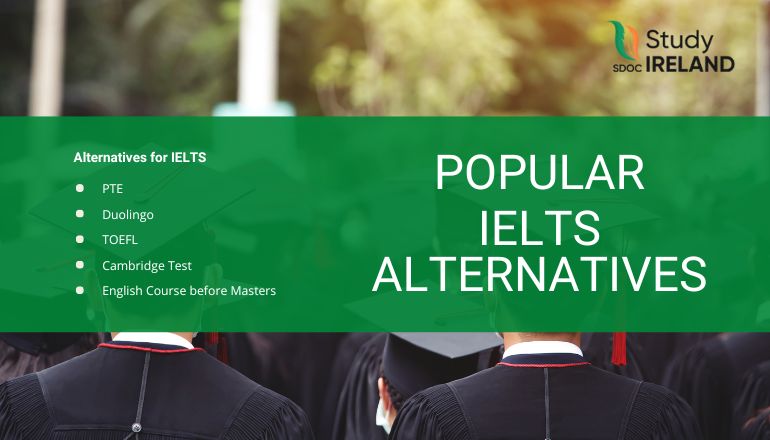Study in Ireland without IELTS | Alternative English Tests

- Last Updated:

Ireland has become an attractive destination for international students seeking quality higher education. To gain admission to Irish universities and colleges, students are usually required to provide evidence of their English language proficiency. The most common way to demonstrate this is by taking the International English Language Testing System (IELTS) exam.
Although the IELTS is widely recognized and accepted by most Irish institutions, some students may struggle to achieve the minimum scores needed for admission. This can be a significant barrier for those who wish to study in Ireland but find the IELTS challenging or have difficulty meeting the required scores.
Fortunately, there are alternative pathways for students to pursue their dreams of studying in Ireland without relying solely on the IELTS exam. This article will investigate and discuss these options, providing valuable information for international students who are seeking to study in Ireland but may not have the necessary IELTS scores.
By exploring these alternative routes, we aim to empower students with the knowledge and understanding of the various opportunities available to them. This will enable them to make informed decisions about their education and take the necessary steps to achieve their goals of studying in Ireland, even if the IELTS exam poses a challenge.

How to study in Ireland without IELTS
Studying in Ireland without taking the IELTS exam is possible for international students who are unable to take the test or wish to avoid the additional cost and time associated with it. Here are some ways to pursue higher education in Ireland without IELTS:
Check for Exemptions and Alternatives
The first step for international students is to check if their preferred institution offers exemptions or alternatives to the IELTS requirement. Many universities and colleges in Ireland may accept other English proficiency tests, such as TOEFL, PTE, or Cambridge English exams. In some cases, the English proficiency requirement may be waived if the student has completed a previous degree or diploma program in English or if their native language is English.
Submit Proof of English Proficiency
Some universities may exempt students from taking an English language proficiency test if they can provide other evidence of their English skills. Acceptable proof may include:
- Previous academic qualifications: Completing secondary education, an undergraduate, or graduate degree in an English-speaking country or with English as the language of instruction.
- Professional experience: Submitting a letter from an employer confirming the use of English as the primary language in the workplace.
- Alternative language tests: Submitting scores from tests such as TOEFL, PTE, or Cambridge English Language Assessment.
- English language courses: Providing a certificate of completion or other documentation from an English language course taken in the student’s home country or Ireland.
Apply for English-Medium Courses
Another option is to apply for English-medium courses, which are programs taught entirely in English. Universities may not require an English proficiency test score for these courses. Examples of English-medium courses include programs in STEM, Business, Arts and Humanities, Social Sciences, and Law. Students should research universities and programs that offer English-medium courses and check the entry requirements on the institution’s website.
Alternatives to Study in Ireland without IELTS
Duolingo English Test (DET)
The Duolingo English Test is an online, adaptive language assessment that can be taken from anywhere with an internet connection. It measures all four language skills (reading, writing, speaking, and listening) in about an hour. The test is accepted by many universities and colleges in Ireland as an alternative to the IELTS.
Test of English for International Communication (TOEIC)
The TOEIC is a standardized test that assesses English language proficiency in a business context. It consists of two separate tests: the Listening and Reading Test and the Speaking and Writing Test. Some institutions in Ireland may accept TOEIC scores as proof of English proficiency.
Pearson Test of English (PTE)
The PTE Academic is a computer-based English language test that assesses listening, reading, speaking, and writing skills. It is accepted by various universities and colleges in Ireland as an alternative to the IELTS. The test takes approximately 3 hours to complete and provides results within 5 business days.
Occupational English Test
The Occupational English Test (OET) is designed to assess the English language proficiency of healthcare professionals. It evaluates listening, reading, writing, and speaking skills in a healthcare context. Some Irish universities and colleges may accept OET scores for admission to healthcare-related programs.
Test of English as a Foreign Language (TOEFL)
The TOEFL is a widely accepted English language test that measures listening, reading, speaking, and writing skills. It is available in two formats: TOEFL iBT (Internet-based Test) and TOEFL PDT (Paper-delivered Test). Many universities and colleges in Ireland accept TOEFL scores as an alternative to the IELTS.
LanguageCert IESOL
LanguageCert IESOL (English for Speakers of Other Languages) is a set of English language qualifications designed to assess the language skills of non-native English speakers. Some Irish institutions may accept LanguageCert IESOL qualifications as proof of English proficiency.
Oxford Test of English (OTE)
The Oxford Test of English is an online, adaptive English language assessment that evaluates reading, writing, listening, and speaking skills. It is designed to be flexible and accessible, allowing test-takers to choose when and where they take the test. Some universities and colleges in Ireland may accept OTE scores.
English Test for Academic and Professional Purposes (ETAPP)
ETAPP is an online English language assessment that measures reading, writing, listening, and speaking skills in academic and professional contexts. It is designed to be convenient and flexible, with test sessions available 24/7. Some Irish institutions may accept ETAPP scores as an alternative to the IELTS.
Common European Framework of Reference for Languages (CEFR)
The CEFR is an international standard for describing language proficiency levels. It consists of six levels, ranging from A1 (beginner) to C2 (proficient). Some universities and colleges in Ireland may accept English language qualifications aligned with the CEFR as proof of English proficiency.
Cambridge Examinations (Proficiency & Advanced)
The Cambridge English Certificates, including C2 Proficiency (CPE) and C1 Advanced (CAE), are well-renowned and very suitable for English assessment and rating. Language tests cover all four language skills (reading, writing, speaking and listening) and are accepted by a university and colleges in Ireland whatever other format the IELTS is.
These alternative English proficiency tests present the students who want to do their study overseas in Ireland the opportunity to choose which one of the tests they want to do when showing their language skills. Every examination, driven by its own techniques of questioning, scoring, and authority, has become an obstacle to understand, show, and get accepted by different institutions. Students must take out some time to research and make an informed decision on the test that suits their style and meets the admission requirement of the university or college they want to choose in Ireland.
Such tests can substitute the IELTS exam, but it is necessary to make a double check concerning the chosen test and it’s acceptance by the participating institutions in order to confirm that its score fulfills the standards for the admission. Apart from all of these, students should also become acquainted with the test layout, its content, and the available preparation materials as well in order to give the best they have to show on the exam.
Through assessing these alternative tests you will be able to extend your alternatives and find the exact way for meeting the language requirements. It would be done while studying in Ireland.

Popular IELTS Alternatives to Study in Ireland
Many top universities in Ireland need English language proficiency as part of the admission process.
| Universities/Colleges | TOEFL | DET | PTE | Cambridge Test |
|---|---|---|---|---|
| Trinity College Dublin | 88 | 110 | 63 | 180 |
| University College Dublin | 90 | 120 | 63 | 176 |
| University of Galway | 88 | 110 | 61 | 180 |
| University College Cork | 90 | 120 | 63 | 176 |
| University of Limerick | 90 | 110 | 61 | - |
| Dublin City University | 92 | 110 | 63 | 176 |
| Technological University Dublin | 80 | 95 | 60 | 180 |
| Dublin Business School | 78 | 95 | - | - |
| Griffith College | 71 | - | 50 | 180 |
| National College of Ireland | 78 | 95 | - | - |
The table above displays the minimum entry requirements for popular IELTS alternatives if you want to study in Ireland without taking the IELTS exam. These requirements are applicable for full-time, part-time, and various courses offered by universities and colleges in Ireland.
Please note that the “–” symbol in the table indicates that the specific test is not accepted or the minimum score requirement is not provided by the respective institution. It is always advisable to check directly with the university or college for the most up-to-date and accurate information regarding their English language proficiency requirements.
Student visa for Ireland without IELTS
International English Language Testing System (IELTS) is one of the most widely recognized English language tests, there are alternative options available for students who have not taken the IELTS exam or are concerned about their IELTS test scores.
You can successfully apply for a student visa for Ireland without an IELTS score by providing evidence of your proficiency in English through other accepted language tests. These alternative tests are recognized by Irish universities and colleges as proof of your English language skills.
To determine the score band requirements for these additional English language tests, please refer to the table provided below. The table outlines the minimum scores needed in various tests, such as TOEFL, PTE, Cambridge English exams, and the Duolingo English Test, which can be used to support your student visa application for Ireland.
By familiarizing yourself with these alternative English language tests and their respective score requirements, you can confidently pursue your dream of studying in Ireland even without an IELTS score. Be sure to check with your chosen institution to confirm which alternative tests they accept and any specific score requirements they may have.
| Exams | Minimum scores required |
|---|---|
| Cambridge English Language Assessments (CELA) | Pass in Preliminary English Test or Pass in First Certificate in English, Cambridge English: Advanced Cambridge English: Proficiency, Business English Certificate (Higher or Vantage) |
| Duolingo English Test | 55-75 |
| English Test for Academic and Professional Purposes (ETAPP) | B1- B2 |
| International English Language Competency Assessment (IELCA) | B1- B2 |
| PTE (academics) | 30 |
| TOEFL | 47 to 61 |
| Oxford Test of English | 81-100 |
| Skills for English Four Facet Test | B1- B2 |
| LanguageCert International ESOL | B1- B2 |
| LanguageCert Academic | 40-60 |
| Trinity College London | Integrated Skills in English ISE I (B1) to Integrated Skills in English ISE II (B2) |
The minimum score ranges from 2nd level and foundation level or preparatory English course to all other courses (not 2nd level and not preparatory English).
FAQ’s about Studying in Ireland without IELTS
Yes, with an acceptance letter from an Irish university stating IELTS is not required.
IELTS is a standardized English proficiency test widely recognized by Irish universities.
Some universities may waive IELTS for students who studied in English-speaking countries or English-medium schools.
Most Irish universities require proof of English proficiency, but some exceptions may apply, such as English-medium courses or alternative tests.
Yes, it is possible to obtain Permanent Residency (PR) in Ireland without taking the IELTS exam. However, you will still need to demonstrate your English language proficiency through an alternative of IELTS.

Article by
Mr. Sandeep Shanmugam
Co-Founder & CEO of Study in Ireland, is a highly experienced educational consultant specializing in helping Indian students pursue their academic aspirations in Ireland. With a Master's in International Business from Ireland and over a decade of experience in various roles, Sandeep brings extensive knowledge of the Irish education system and job market to guide students effectively.


